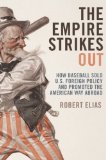The Empire Strikes Out – by Robert Elias
 Before we dive into this book, in the interest of full disclosure I feel I should inform you that I was a student of Robert Elias while at the University of San Francisco, where I took his class “The American Dream and the American Pastime: Baseball as a Cultural Mirror of America.” It was one of my favorite classes while at USF and he remains a good friend to this day, yet as friends can and should do, they provide objective reviews of each other and their work. Is it a bit weird to be reviewing a former professor’s book? Yes – but then again, my classmates and I reviewed his work while in school, so it’s not that foreign of a concept. This time it just goes on the internet for everyone to see as opposed to the Scantron form that went in the manila envelope at the end of the semester and was sent to the dean’s office or our thoughts on his class discussions that we bantered about over coffee in the cafeteria as we struggled to write papers or watch all of Ken Burns’ Baseball documentary. Moving on…
Before we dive into this book, in the interest of full disclosure I feel I should inform you that I was a student of Robert Elias while at the University of San Francisco, where I took his class “The American Dream and the American Pastime: Baseball as a Cultural Mirror of America.” It was one of my favorite classes while at USF and he remains a good friend to this day, yet as friends can and should do, they provide objective reviews of each other and their work. Is it a bit weird to be reviewing a former professor’s book? Yes – but then again, my classmates and I reviewed his work while in school, so it’s not that foreign of a concept. This time it just goes on the internet for everyone to see as opposed to the Scantron form that went in the manila envelope at the end of the semester and was sent to the dean’s office or our thoughts on his class discussions that we bantered about over coffee in the cafeteria as we struggled to write papers or watch all of Ken Burns’ Baseball documentary. Moving on…
To say that baseball is intertwined with America would be an amazing injustice – and in many more ways and at many deeper levels than you might think. In his latest book, The Empire Strikes Out, Robert Elias shows how baseball transformed from a simple game into a tool of spreading American idealism not only throughout the world but domestically as well.
Elias begins his introductory chapter with a quote from the French Algerian philosopher Albert Camus, stating “The true patriot is one who gives his highest loyalty not to his country as it is, but to what it can and ought to be.” This quote, innocent as it might seem at the time, is one that the reader must keep in mind while reading the book, as Elias’ critical look at how baseball has been intertwined with American expansion will likely challenge the typical flag-waving fan.
Over the course of 12 chapters, as well as an opinion-laden 13th, Elias take the reader through American history, from 1775 all the way up to 2009, bringing in baseball as a hand-holding partner of the United States’ desire to expand throughout the world and convert, control, and cash in on people in other lands.
When one stops and thinks about it, the tie-ins are plentiful – from the drafting of ballplayers to fight in wars, to Barry Zito of the San Francisco Giants and his “Strikeouts for Troops” program. Let’s not leave out the San Diego Padres and their camouflage jerseys, or the world tours led by Albert Spalding to promote not only the American way but his budding sporting goods company.
Tie-ins and associations, as well as traditions that come from culture, religion, or national dictate, only have the credence that the participants are willing to give them. There is no inherent necessity to sing The Star Spangled Banner before a baseball game or that a fleet of military jets fly over the stadium before the All-Star Game or the World Series. Yet were one to propose that a ballgame not start with the playing or singing of the anthem, the idea – and possibly the person – would likely be shot down as unpatriotic and ridiculous. Yet the more we allow them to occur, the more they become ingrained and immune from scrutiny.
Certainly some of these relationships have developed without the intention of brain-washing the American people into agreeing with the government’s foreign plans, but as Elias shows, a good number have been formed to promote the idea of American superiority and manifest destiny. This is the core of the book — and what Elias challenges the reader to look at and accept.
The book is full of tidbits of baseball information that Elias has dug up to illustrate his points. From the explanation of where the term “Yankee” comes from at the start of the first chapter, to the origins of the term bullpen, to his comparison of globalization to baseball’s farm system of minor league teams, the book is full of “I didn’t know that” moments that will enhance your appreciation for the game that you see on the field today. It is this hook that will keep the pages turning, even though the book at times does feel a bit academic for those of us not reporting to classrooms on a regular basis.
What I found to be lacking, at least for those who don’t share Elias’ academic leaning, is some sauce for the story. Elias searches far and wide for sources and information to support his case, but at certain times over his 294 pages the breadth of information would have been gladly exchanged for some depth and development. I would have loved to been able to share one or two really juicy stories with people after reading it, as opposed to telling them about the book from a flyover perspective.
Elias wastes no time being critical about what he sees as missteps in the United States’ history, and it has earned him his share of critics.
Steven V. Roberts of The Washington Post, wasting no time in his review of the book, starts off by saying that “Robert Elias seems to hate America and hate baseball.” For me, nothing could be farther from the truth. Being critical of America’s approach to globalization, or “Americanization” as some might call it, does not mean that one hates America. Having sat with Elias at several baseball games and exchanged e-mails about the perils and plights of the Giants, Mariners, Diamondbacks and other teams, I assure you he does not hate baseball – at least not the game itself. He has played the game extensively, has children that play baseball, and will gladly engage in an informed conversation on most any topic of the game.
Elias even writes extensively about his relationship with baseball on his website, which further illustrates both his fondness for and dissatisfaction with the game.
While I will not respond to Mr. Roberts’ review, he seemed to be offended by Elias’ opinions that America’s growth has an ugly side, as does the business side of baseball. If you can’t swallow the fact that neither baseball nor the United States is perfect and under God’s watchful eye and guiding hand, then I suggest you avoid this book. It is not meant for you, and you’d be better off living in your make-believe world, cleaning off your rose-colored glasses.
As Elias will tell you, there is a lot to love about baseball, but there is a lot to be critical about and wary of when looking towards the future. The purity of a parent and child having a catch on a warm day is one to be cherished, as are the squeals of children in a Little League game and the roar of the crowd when the home team wins a ball game. But as fallible creatures, humans have done things that fall short of our potential and should be subjected to not just scrutiny and criticism, but used as mistakes to learn from so that history does not continue to repeat itself. This is what Elias seeks to do and accomplishes it to a level that has clearly irritated critics.
The book, unsurprisingly, is delivered in classic academic form – lots and lots of history, references and examples that all lead up to the final chapter, which is where Elias makes his argument about not just how baseball has been used to spread the American way, but its ramifications and an opinion on how he feels about it. It is in that 13th chapter that Elias serves up the question of how baseball should proceed – either doubling up on its association with patriotism, or letting football take up that battle while becoming a beacon for what the country could, and should, be like going forward.
If you have the ability to read and digest criticism of both the United States and its national pastime, I doubt that you’ll be disappointed by The Empire Strikes Out. You may not agree with everything, but I don’t think that is Elias’ point; it is simply to open your eyes and cast a warning on the future of the country and baseball by taking a critical look at its past. By doing so, he exposes you to a history rich with lofty ideals but littered by faulty executions, and leads you back to the present moment and offers a set of paths to walk down, while ultimately leaving decision about which one to walk down to each of us.

I’m a huge fan of your site and I read it regularly. Keep up the excellent work!
Great Information, thanks for the fine Article. Really great topic to write about on my Site. I might set a link from another Blog. Shelving
Greetings from California! I’m bored at work so I decided to check out your site on my iphone during lunch break. I love the information you provide here and can’t wait to take a look when I get home. I’m amazed at how fast your blog loaded on my cell phone .. I’m not even using WIFI, just 3G .. Anyways, wonderful site!